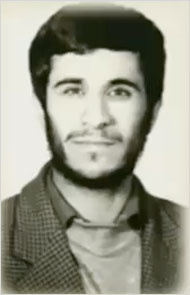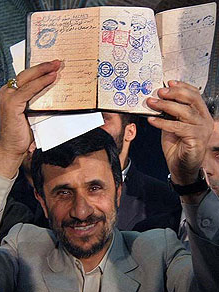Der iranische Präsident hat in einer Rede vor dem Geheimdienst seines Landes den 11. September als einen Plot des amerikanischen Geheimdienstes bezeichnet. Er sei ausgeführt worden, um einen Vorwand zur Invasion Afghanistans zu haben.
Solchen Unfug kennt man natürlich auch in der westlichen Welt von unseren Verschwörungstheoretikern. Aber die sind in aller Regel nicht Regierungschefs.
Juan Cole deutet dieses Dokument auf seiner Website ausführlich als Dokument eines speziell iranisch-manichäischen Weltbildes, das aus der altpersischen Zarathustra-Religion in den Schiismus eingewandert sei. Interessant.
Ich bin nicht Coles Meinung, dass Achmadinedschad niemals zur Vernichtung Isarels aufgerufen habe, sondern nur der historischen Überwindung der „zionistischen Einheit“ entgegengfiebere. (Hier meine Analyse seiner berühmten Rede.)
Ahmadinezhad, who was speaking at a meeting with the minister, deputy ministers, managers, and personnel of the Intelligence Ministry, congratulated the auspicious birthday anniversary of the prophet of light and compassion, His Holiness Muhammad al-Mustafa (peace be upon him) and the birthday anniversary of Imam Sadeq (Sixth Shi’i imam) (peace be upon him), IRNA reported on Saturday (6 March), quoting the presidential website. He said that the Intelligence Ministry’s personnel are the best collection of Hezbollahi (members of Party of God; meaning pious) forces and added: Today, the Islamic Republic of Iran’s intelligence system is the most virtuous intelligence system in the world.
The President said that the Lord of the Age’s Unknown Soldiers (intelligence forces) have a divine and sacred mission. He said: The Intelligence Ministry should be the most coordinated, organized, powerful, and flowing (Persian — Ravantarin) organization in the country.
The President said that the purpose of man’s creation was to establish a world government based on monotheism and justice. He added: Throughout history, devils fought against prophets and pious people. The climax of man’s fight against devils is taking place in our time. Today, the devils show that they are gathered at the forefront of the world arrogance.
He added: Man’s nature is a divine and heavenly one. When man’s thought and nature are limited to worldly affairs, then he will have no option but to fall.
The President said that capitalist thoughts have resulted in plundering, bullying, and the killing of mankind’s essence. He said: Liberal democracy is the result of a fight between power and wealth. The US-led world arrogance’s front against the Islamic Republic is the climax of the fight between the monotheism front and devils.
The head of the Supreme National Security Council said that all vices in history have gathered in the arrogance front. He said: The crimes committed by the world arrogant are unprecedented in history. Today, the heaviest massacre and terrorist actions in the world are carried out by their (the arrogant of the world) accomplices by raising the flag of human rights.
Ahmadinezhad said that the materialist thoughts were challenged and Marxism was destroyed after the emergence of the Islamic Republic. He said: Thanks to the grace of God, the capitalist system founded by the Zionists has reached the end of its path.
The president added: US invasions and NATO’s military expedition in the region are merely aimed at saving liberal democracy and the capitalist school of thought.
He said that the September 11 attacks and the demolition of the Twin Towers in the US were a complex scenario carried out by the intelligence (Persian — Eqdam-e Ettela’ati). He said: The 11 September event was a big lie. It paved the way for the military expedition to Afghanistan under the pretext of fighting with terrorism.
Ahmadinezhad referred to the arrest of Abodlmalek Rigi by the Soldiers of the Lord of the Age (the Iranian intelligence forces) and said: The arrest of this terrorist bandit has humiliated the intelligence services of the US, Britain, and the Zionist regime. . .
(Description of Source: Tehran IRNA in Persian — Official state-run online news agency, headed as of January 2010 by Ali Akbar Javanfekr, former media adviser to President Ahmadinezhad. URL:http://www.irna.ir)

